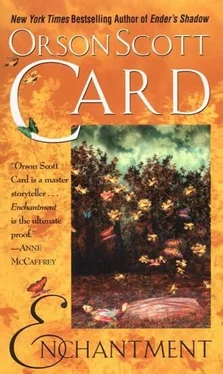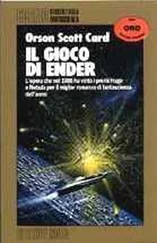Orson Card - Enchantment
Здесь есть возможность читать онлайн «Orson Card - Enchantment» весь текст электронной книги совершенно бесплатно (целиком полную версию без сокращений). В некоторых случаях можно слушать аудио, скачать через торрент в формате fb2 и присутствует краткое содержание. Жанр: Фантастика и фэнтези, на английском языке. Описание произведения, (предисловие) а так же отзывы посетителей доступны на портале библиотеки ЛибКат.
- Название:Enchantment
- Автор:
- Жанр:
- Год:неизвестен
- ISBN:нет данных
- Рейтинг книги:5 / 5. Голосов: 1
-
Избранное:Добавить в избранное
- Отзывы:
-
Ваша оценка:
- 100
- 1
- 2
- 3
- 4
- 5
Enchantment: краткое содержание, описание и аннотация
Предлагаем к чтению аннотацию, описание, краткое содержание или предисловие (зависит от того, что написал сам автор книги «Enchantment»). Если вы не нашли необходимую информацию о книге — напишите в комментариях, мы постараемся отыскать её.
Enchantment — читать онлайн бесплатно полную книгу (весь текст) целиком
Ниже представлен текст книги, разбитый по страницам. Система сохранения места последней прочитанной страницы, позволяет с удобством читать онлайн бесплатно книгу «Enchantment», без необходимости каждый раз заново искать на чём Вы остановились. Поставьте закладку, и сможете в любой момент перейти на страницу, на которой закончили чтение.
Интервал:
Закладка:
"No," said Father. "And if you haven't the heart to rule without it, if you need the modern world, then you don't have to stay here. You don't have to be king. One of your brothers will, or your sister. Or none of them, and the people can elect another, or the high king will take the land. History will move on, whatever you decide. You don't have to take the burden on you."
"I will, though," said Matfei.
"If you do, then that will be good, it will be the life you chose. But if you don't, it won't mean that you failed. You're a child of both worlds. With any luck, the choice won't be forced upon you too soon."
Father and Mother could be so inscrutable sometimes, full of mysterious wisdom. Didn't they know how much children were able to guess? How much they could understand if only someone would explain it to them? When we're parents, the children told each other, we'll tell our children everything.
They got to the airport, they kissed Grandpa and Grandma good-bye, they flew to Kennedy, then on to Vienna, then to Kiev. There were the days at Uncle Marek's farm. And then at last it was time to cross the bridge.
They never took the same way twice, for fear of making a path. The clearing opened before them. The chasm yawned. Then all joined hands and the bridges both appeared. They crossed to the middle and stopped, for this was a tradition that they never broke. There on the pedestal in the middle of the moat, Father and Mother sat on the slab where Mother had slept the deep enchanted sleep of centuries, and he kissed her, once, a sweet and simple kiss.
This time it was Little Esther's turn to finally understand. "Mama!" she said. "You're Sleeping Beauty!" Her brothers laughed and praised her for figuring it out. Mother and Father hugged her and let her lie on the slab herself. She closed her eyes and then said, "Kiss me, somebody, and wake me up!" And her father knelt down, and bent over her, and kissed her, while Matt and Steven and Luke all growled and roared like bears.
Then they joined hands again, the bridges appeared, and they crossed into Taina.
No one waited for them—that was what they asked for, not so much for privacy as because the day of their arrival was never certain, for the calendars of the two places fit together unpredictably. Why should someone waste his life waiting and watching for a queen and king who could find their own way through the woods?
This time, though, they didn't rush away from the chasm. The children were told to play—"But stay away from the edge!"—while Mother and Father stood beside the pit and talked.
"What if one of us dies?" Ivan said to her. "A car crash. An accident at harvest time. Everyone will be stranded then, on whatever side of the bridge we're on."
"If only the children had been born with the power to use both bridges."
"But they can't use either of them without us, and they need both of us to cross at all. We can't leave this to chance, can we? Don't we want the children to be free to choose?"
"They're too young to divide the family."
"I don't want to divide us either," said Ivan. "I want us to live to be a hundred. But life is fragile."
"Someday we'll make them choose, and settle them on whichever side they want, and then we'll choose ourselves, and stay together in the world we want to grow old in. But not yet."
"So if one of us dies..."
"We plan what we plan, and if it doesn't work out, then that's the way life will be. What else can we do? Divide the family now, and guarantee unhappiness, for fear of a different misery later?"
"You're right," said Ivan. "You're right, of course. But having children makes a man afraid."
"Afraid, yes, and also very brave."
"Did we really do the things the stories say?" asked Ivan.
"We did."
"And tell me, Sleeping Beauty, are you living happily ever after?"
"Yes, I am."
They called the children then, and as they made the trek through the wood, Matfei joked that Father ought to take his clothes off so people would recognize him when he arrived. "We should never have let people tell those stories to the children," Ivan said to Katerina.
They got to the village and the cheering started, the crowds following them, the parade. They sat down to a feast and heard tales of the winter past, and who had babies, who died, who got married.
It was nearly dark before Ivan and Katerina slipped away and went to the church, where Bishop Sergei was waiting for them, greeting them with a kiss and an embrace. Together they walked into the graveyard, where King Matfei's body had been buried five winters before, and where Father Lukas had a little shrine. "He'll never be a saint," said Sergei ruefully, "and in truth he didn't deserve it. But he was a hero all the same."
"And a great missionary," said Katerina.
"So are the children Jews or Christians?" asked Sergei.
"In Ivan's country, they are Jews," said Katerina. "And here they're Christians. Two worlds. Two lives. Someday they'll decide. Or God will decide for them."
"Doctrinally, there are problems with that," said Sergei. Then he laughed. "But I'm glad you're here."
"So are we," said Ivan. "We miss our dear friends when we're away."
They left the graveyard then, and returned to the royal house, where they had to speak sternly to the children before they'd finally go to bed. Then they, too, lay down on mattresses stuffed with straw, hearing the music of the flies to buzz them to sleep, holding each other's hands as they dozed, thinking of the miracles by which love works its will in the world.
Acknowledgments
Since this novel is set in milieux that are unfamiliar to me, I have relied on various sources, especially:
Pinhas Sadeh, Jewish Folktales, trans. Hillel Halkin (New York: Anchor, 1989; 441 pp.). For stories and motifs used in Enchantment, especially the story of the Sky, the Rat, and the Well.
Charles Downing, Russian Tales and Legends (H. Z. Walck, 1968; 215 pp.). For stories and motifs used in Enchantment.
Vladimir Propp, Morphology of the Folktale, trans. Laurence Scott (Austin: University of Texas Press, 1968; 158 pp.). The pivotal book whose conclusions Ivan is testing.
Hillel Halkin, "Feminizing Jewish Studies," Commentary 105:2 (February 1998, pp. 39-45). For the rhetoric of Jewish feminism.
Jerome Blum, Lord and Peasant in Russia: From the Ninth to the Nineteenth Century (Princeton, N.J.: Princeton University Press, 1961; 656 pp.). For a rough idea of how the Russian people were governed before the dominance of the Rus'.
Marjorie Mandelstam Balzer, ed. Russian Traditional Culture: Religion, Gender, and Customary Law (M. E. Sharpe, 1992). Many articles were very helpful in grounding my speculations about religion and law in the imaginary kingdom of Taina.
Bruce Cockburn, for the album Ivan listens to in chapter 14. Sharp-eyed readers will note that The Charity of Night was released in 1997, rather too late for Ivan to listen to it in 1992. But my opinion is that if you can accept the idea of Ivan and Katerina passing back and forth between 1992 and 890, there should be no problem with Cockburn's music traveling only four years back in time. Think of it as the sound track for that scene.
Sam Kinison, whose screaming comedy is sorely missed, died only a few months before the 747 returned from Taina. But this novel is a fantasy, and in that fantasy Kinison is still alive.
Alexander Pushkin, Eugene Onegin, trans. James E. Falen (Oxford University Press, 240 pp.). The best of the translations, I found it with the help of Douglas Hofstadter, Le Ton Beau de Marot.
I owe thanks to many individuals for helping me create this novel or prepare it for publication, particularly:
Читать дальшеИнтервал:
Закладка:
Похожие книги на «Enchantment»
Представляем Вашему вниманию похожие книги на «Enchantment» списком для выбора. Мы отобрали схожую по названию и смыслу литературу в надежде предоставить читателям больше вариантов отыскать новые, интересные, ещё непрочитанные произведения.
Обсуждение, отзывы о книге «Enchantment» и просто собственные мнения читателей. Оставьте ваши комментарии, напишите, что Вы думаете о произведении, его смысле или главных героях. Укажите что конкретно понравилось, а что нет, и почему Вы так считаете.










